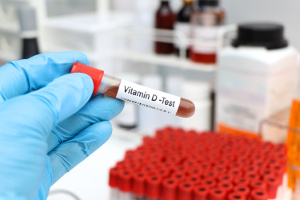Being vitamin D-deficient doubles your risk of dying from melanoma
 Melanoma is a type of malignant skin cancer that spreads rapidly. Being vitamin D-deficient doubles the risk of dying of the disease, according to a Spanish study that was presented at the European Academy of Dermatology and Venereology congress. It is commonly known that sunburns, which one should generally avoid, increase the risk of contracting skin cancer. But we must not forget that the summer sun is our main source of vitamin D and at our latitude, it necessary to take a vitamin D supplement in the wintertime. People who avoid the sun or have difficulty with synthesizing vitamin D in their skin should take a supplement all year round.
Melanoma is a type of malignant skin cancer that spreads rapidly. Being vitamin D-deficient doubles the risk of dying of the disease, according to a Spanish study that was presented at the European Academy of Dermatology and Venereology congress. It is commonly known that sunburns, which one should generally avoid, increase the risk of contracting skin cancer. But we must not forget that the summer sun is our main source of vitamin D and at our latitude, it necessary to take a vitamin D supplement in the wintertime. People who avoid the sun or have difficulty with synthesizing vitamin D in their skin should take a supplement all year round.
A group of dermatological scientists has found that patients with melanoma have a 2.3 times greater risk of dying of their disease if their blood levels of vitamin D are too low (below 10 ng/ml = 25 nmol/L), compared with melanoma patients with sufficient amounts of vitamin D in their blood. The study, which is published in Cancer Research, included 264 patients from Hospital Clinic de Barcelona in Spain. All patients suffered from invasive melanoma, and their disease had spread to such a degree that it gave them a poor prognosis. The scientists counted the number of surviving melanoma patients in both of the vitamin D groups. They used various statistical analysis methods such as the Kaplan-Meier curve and other models to rule out confounders. The study’s result remained significant after the scientists had adjusted for the patients’ age at the time of their diagnosis, gender, and the Breslow index (a measure of how far melanoma has invaded the body). The scientists claim that vitamin D plays a significant role in connection with melanoma, and patients who lack the vitamin are far more likely to die of their disease.
Facts about melanoma and its prevalence
- Melanoma is a type of skin cancer that develops in the melanocytes (pigment-producing cells
- Once the disease starts to metastasize, the prognosis is bad
- In 2020, melanoma was believed to account for 4% of all cancers and 1.3% of all European cancer deaths
- In 2020, 7,031 women and 9,457 men died of melanoma
How does vitamin D protect against melanoma?
Most cells in the human body have vitamin D receptors (VDR), including the skin cells. Vitamin D switches various genes on and off and affects cell growth. A study from the University of Leeds in England found that vitamin D affects melanoma cells, causing them to become less aggressive. In studies of mice, scientists have found that vitamin D and VDR affect different genes and signaling pathways, thereby making melanoma cells less aggressive and helping the immune system fight the cancer cells.
According to the researchers, patients with melanoma should have their vitamin D levels measured, and supplements of vitamin D should be used to optimize blood levels of the nutrient, simply because it is likely that vitamin D can improve the outcome of standard therapy for treating melanoma.
- Two different methods are used to measure blood levels of vitamin D, and that can easily confuse people
- When converting ng/ml to nmol/L, ng/ml should be multiplied by 2.5
- That way, 10 ng/ml equals 25 nmol/L
- Optimal levels are higher than 75 nmol/L (30 ng/ml)
References:
Vitamin D deficiency in melanoma patients associated with worse overall survival, new study finds
European Academy of Dermatology and Venereology. MedicalExpress 2022
Sathya Muralidhar et al. Vitamin D-VDR signaling inhibits Wnt/beta-catenin-mediated melanoma progression and promotes anti-tumor immunity. Cancer Research 2019
Anna A et al. Relevance of Vitamin D in melanoma development, Progression and Therapy. Anticancer research 2020
Cancer Research UK. Vitamin D dials down the aggression in melanoma cells. ScienceDaily. 2019
Search for more information...
- Created on .








